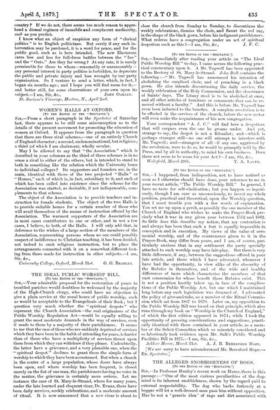THE IDEAL PUBLIC WORSHIP BILL.
[TO THE EDITOR OF THE " SPECTATOR.1 SIR,—Your admirable proposal for the restoration of peace to troubled parishes would doubtless be welcomed by the majority of the High-Church clergy, who could have no objection to give a plain service at the usual hours of public worship, such as would be acceptable to the Evangelicals of their flock ; but I -question very much whether the " spiritual despots " who represent the Church Association—the real originators of the Public Worship Regulation Act—would be equally willing to grant the most moderate demands in the way of services, even if made to them by a majority of their parishioners. It seems to me that the case of those who are suddenly deprived of services which they have been in the habit of attending for years, is harder than of those who have a multiplicity of services thrust upon them from which they can withdraw if they please. Undoubtedly, the latter have a grievance, and a very plausible one, when the -" spiritual despot " declines to grant them the simple form of worship to which they have been accustomed. But when a church in the centre of a large population, whose doors have always been open, and where worship has been frequent, is closed merely on the fiat of one man, the parishioners having no voice in the matter, the grievance is certainly more serious. Let me instance the case of St. Mary-le-Strand, where for many years, under the late learned and eloquent vicar, Dr. Evans, there have been daily services, weekly celebrations, and a moderate amount of ritual. It is now announced that a new vicar is about to
close the church from Sunday to Sunday, to discontinue the weekly celebrations, dismiss the choir, and flaunt the red rag, in the shape of the black gown, before his indignant parishioners. What redress have a congregation under an act of spiritual despotism such as this P-1 am, Sir, &c., S. F. C.


































 Previous page
Previous page